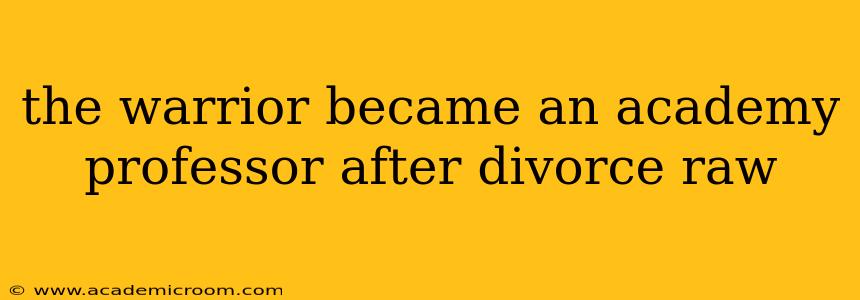The Warrior's Unexpected Transition: From Battlefield to Blackboard After Divorce
The image of a grizzled warrior swapping camouflage for a tweed jacket and a battlefield for a lecture hall might seem jarring, but it's a narrative brimming with potential for compelling storytelling. This article explores the complex journey of a warrior transitioning to an academy professor after a divorce, examining the challenges, the unexpected benefits, and the profound personal transformation involved.
This isn't just a simple career change; it's a complete overhaul of identity, routine, and even self-perception. The transition requires immense resilience, adaptability, and a willingness to confront deep-seated emotions stemming from both military life and the dissolution of a marriage.
What motivates a warrior to become a professor after divorce?
The reasons are as varied as the individuals themselves. Some might seek a less volatile and unpredictable life than the one they experienced in the military. The structured environment of academia can offer a sense of stability and control, a welcome contrast to the chaotic nature of combat. Divorce, often a period of profound introspection and reevaluation, can act as a catalyst for this dramatic shift in direction. Many find solace and purpose in sharing their knowledge and experience, offering guidance to a new generation. The intellectual stimulation and opportunity to contribute to society can be incredibly fulfilling after the emotional turmoil of divorce. The transition allows them to use their leadership skills and strategic thinking in a different context.
How does military training translate to academic life?
Surprisingly, the skills honed in the military can be remarkably transferable to academia. Discipline, strategic thinking, effective communication, and the ability to manage complex situations under pressure are all highly valued in both environments. A warrior's experience with leadership, team building, and problem-solving can greatly enhance their ability to manage students, conduct research, and navigate the sometimes intricate dynamics of university life. Their ability to remain calm and composed under stress can be invaluable in handling challenging students or administrative hurdles.
What challenges do they face in making this transition?
The transition is far from seamless. Warriors might face challenges adjusting to a more bureaucratic and less hierarchical environment. The pace of academic life can feel slow compared to the fast-paced demands of the military. They may struggle with the shift from action-oriented tasks to more theoretical and analytical work. Dealing with the emotional aftermath of divorce while simultaneously navigating a new career path can be incredibly taxing. Furthermore, they might encounter difficulties establishing credibility in a new field, requiring them to prove their skills and knowledge in a fundamentally different context. They may even encounter societal biases and preconceived notions about veterans transitioning into academia.
Does the divorce impact their teaching style?
The experience of divorce can profoundly shape a professor's teaching style. Having navigated their own emotional challenges, they may bring a greater level of empathy and understanding to the classroom. They might be more adept at handling diverse personalities and fostering a supportive learning environment. Their personal journey can inform their teaching, offering valuable lessons on resilience, adaptation, and navigating difficult situations with grace.
What are the long-term effects of this transition?
For many warriors, the transition to academia after divorce represents a period of significant personal and professional growth. It allows for the development of new skills, the exploration of untapped potential, and the creation of a more fulfilling life. The sense of purpose found in teaching and research can be incredibly restorative, providing a pathway to healing and self-discovery. The long-term effects can be transformative, leading to a greater sense of personal satisfaction and a lasting contribution to society.
This journey from warrior to professor is not just a story of career change; it's a testament to human resilience, adaptability, and the remarkable capacity for transformation in the face of adversity. It is a narrative that deserves to be explored and celebrated.
